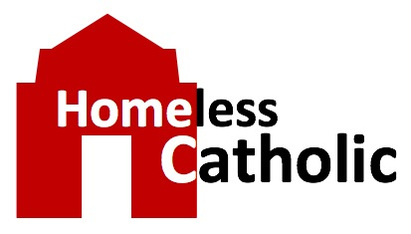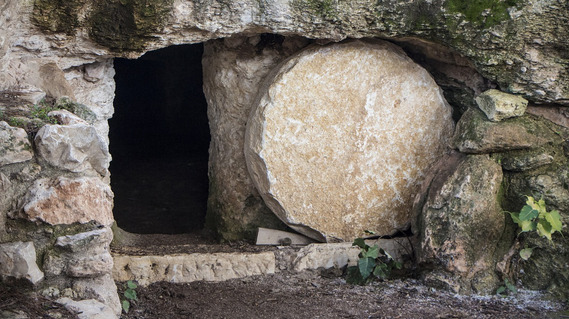The Church is at the Lord’s tomb
The authors of the Apostles' Creed and the Athanasian Creed refer to this day as "The Harrowing of Hell," when after his death, Christ descended into hell (or Sheol in Hebrew or Hades in Greek) to free all the souls who had died since the beginning of the world and allow the trapped righteous souls to reach heaven.
Image by TC Perch
The Church is at the Lord’s tomb
By Tim Trainor
Holy Saturday At the Easter Vigil
Psalm 4
Acts 2:22-28
Matthew 27: 57-65
On Holy Saturday, per liturgical guidance, mass is not celebrated. The Church abstains from the celebraåtion of the sacrifice of the Mass, and Holy Communion may only be given in the form of Viaticum. Plus, the celebration of marriage is not allowed.
The Church is at the Lord’s tomb, meditating on his passion and death and his descent into hell, awaiting his resurrection with prayer and fasting. If scripture for a celebration on that day is desired, traditionally, the Divine Office of Readings and Morning Prayer are used by the participants.
We focus on the image of the crucified Christ lying in the tomb, and His descent into hell, which are the main mysteries that Holy Church wishes us to recall on this day.
The Divine Office of Readings for Holy Saturday can be found at https://divineoffice.org/lent-hw-sat-or/?date=20240330
The homily in this Office reading cites the ancient text that the Catechism extracted from paragraph 635. It was quoted by Pope Benedict XVI in one of his homilies. According to the Bible, Jesus's followers and family held a vigil for him outside his tomb, awaiting his foretold resurrection. All four Biblical references to this vigil are fairly short, but the longest of these accounts is the one in Matthew 27:45–56.
There are no direct references in the canonical Bible to what Jesus did while the apostles and his family sat vigil, except His last words to the Good Thief: "Today you will be with me in paradise" (Luke 23:33–43). There are some indirect references elsewhere in the Bible.
The authors of the Apostles' Creed and the Athanasian Creed refer to this day as "The Harrowing of Hell," when after his death, Christ descended into hell (or Sheol in Hebrew or Hades in Greek) to free all the souls who had died since the beginning of the world and allow the trapped righteous souls to reach heaven.
This ancient homily appears to be drawn from the apocryphal text known as the Gospel of Nicodemus, which states:
"Then the Lord, stretching forth his hand, made the sign of the cross upon Adam, and upon all his saints. And taking hold of Adam by his right hand, he ascended from hell, and all the saints of God followed him." (Gospel of Nicodemus 19:11–12).
The stories that originate in the "Gospel of Nicodemus" (also known as the "Acts of Pilate" or "Gospel of Pilate") are referred to in the Bible in several places. The most significant one is 1 Peter 3:19-20, where Peter tells us that Jesus "went and made a proclamation to the spirits in prison, who in former times did not obey when God waited patiently in the days of Noah.”
In the Apostles' Creed, we say that, as a true man, Jesus experienced death. As truly God, Jesus went to “hell” to announce the good news of salvation. However, by “hell,” the creed does not mean only the place of the damned but also the realm of those people who were deprived of the vision of God until the coming of the Savior (see: CCC, para. 631-637). Later, in 1 Peter 4:6, he explains why Jesus announced the good news of salvation to the “righteous” dead and opened the gates of heaven to them through his resurrection (so they could be with GOD!).
I found two Old Testament references that appear to speak to this. First, from Job 14:14, “If a man die, shall he live again? All the days of my appointed time will I wait, till my change come.” Lastly, this one from Psalm 22:30, which, to me, strongly foreshadows Jesus' descent into Hell or Sheol: “All those sleep in the earth will bow low before God (Jesus). All who have gone down into the dust will kneel in homage.”
On Holy Saturday, the day Christ lies in His tomb, the Catholic Church places this remarkable homily before us in the Divine Office. Scholars believe this homily was composed by Melito, Bishop of Sardis, who died around 180 AD. It tells the story of Christ’s triumphal descent through a dramatic rendering of Christ’s appearance in the place of the dead, where he encounters Adam and Eve and all the faithful waiting for deliverance.
This homily is full of paradoxes: The Son of God has died in the flesh and now “sleeps” in the tomb. But this One who is “asleep” enters the realm of the dead to “wake” the dead from sleep and lead them out of that realm and up to God's dwelling place.
Holy Saturday is not just the day we wait quietly and mournfully with Christ in the tomb. We also recognize that on this day Christ also descended to the place of the dead and rescued all faithful souls, bringing them into the full glory of His Father’s kingdom.
With that background established, let's hear the ancient homily written by a Bishop around 170 AD. Hopefully, it will help us focus on some of the divine mysteries held on Holy Saturday.
“Something strange is happening — there is a great silence on earth today, a great silence and stillness. The whole earth keeps silent because the King is asleep. The earth trembled and is still because God has fallen asleep in the flesh and He has raised up all who have slept ever since the world began. God has died in the flesh and hell trembles with fear!
He has gone to search for our first parent, as for a lost sheep. Greatly desiring to visit those who live in darkness and in the shadow of death (see Luke 1:79), He has gone to free from sorrow the captives Adam and Eve, He who is both God and the son of Eve.
The Lord approached them bearing the cross, the weapon that had won Him the victory. At the sight of Him, Adam, the first man GOD had created, struck his breast in terror and cried out to everyone: ‘My Lord be with you all.’ Christ answered him: ‘And with your spirit.’ He took him by the hand and raised him up, saying: ‘Awake, O sleeper, and rise from the dead, and Christ will give you light.’ (a direct quote from Ephesians 5:14).
‘I am your GOD, who for your sake have become your son. Out of love for you and for your descendants (you and me!) I now by my own authority command all who are held in bondage to come forth, all who are in darkness to be enlightened, all who are sleeping to arise. I order you, O sleeper, to awake. I did not create you to be held a prisoner in hell. Rise from the dead, for I am the life of the dead. Rise up, work of my hands, you who were created in my image. Rise, let us leave this place, for you are in me and I am in you; together we form only one person and we cannot be separated.
Rise from the dead, for I am the life of the dead. Rise up, work of my hands, you who were created in my image.
For your sake I, your God, became your son; I, the Lord, took the form of a slave; I, whose home is above the heavens, descended to the earth and beneath the earth (see Philippians 2:6-7). For your sake, for the sake of man, I became like a man without help, free among the dead. For the sake of you, who left a garden, I was betrayed to the Jews in a garden and I was crucified in a garden.
See on my face the spittle I received in order to restore to you the life I once breathed into you. See there the marks of the blows I received in order to refashion your warped nature in my image. On my back see the marks of the scourging I endured to remove the burden of sin that weighs upon your back. See my hands, nailed firmly to a tree, for you who once wickedly stretched out your hand to a tree.
I slept on the cross and a sword pierced my side for you who slept in paradise and brought forth Eve from your side. My side has healed the pain in yours. My sleep will rouse you from your sleep in hell. The sword that pierced me has sheathed the sword that was turned against you.
Rise, let us leave this place. The enemy led you out of the earthly paradise. I will not restore you to that paradise, but I will enthrone you in heaven. I forbade you the tree that was only a symbol of life, but see, I who am life itself am now one with you. I once appointed cherubim to guard you as slaves are guarded, but now I make them serve you as they would God.
The throne formed by cherubim awaits you, its bearers swift and eager. The bridal chamber is adorned, the banquet is ready, the eternal dwelling places are prepared, the treasure houses of all good things lie open. The kingdom of heaven has been prepared for you from all eternity.”

